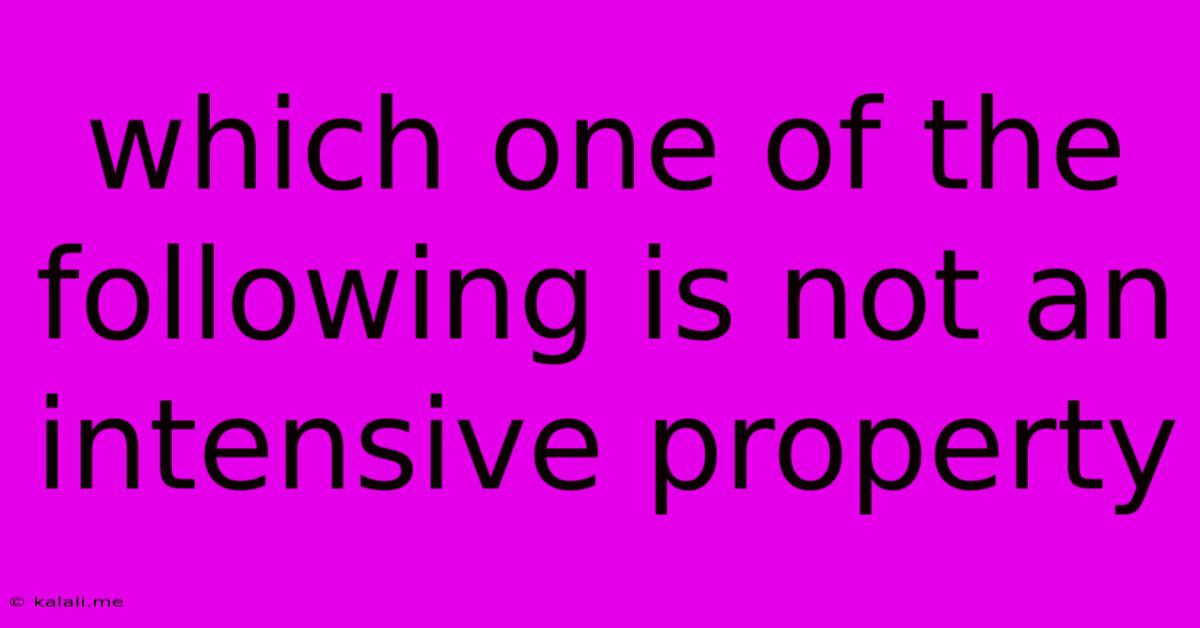Which One Of The Following Is Not An Intensive Property
Kalali
Jun 15, 2025 · 3 min read

Table of Contents
Which One of the Following is NOT an Intensive Property? Understanding Intensive vs. Extensive Properties
This article will delve into the difference between intensive and extensive properties, ultimately answering the question: which property from a given list isn't intensive? Understanding this distinction is crucial in various fields, including chemistry, physics, and engineering. We will explore the definitions, provide clear examples, and offer a simple method for identification.
What are Intensive and Extensive Properties?
Before we can identify which property isn't intensive, let's define both terms:
-
Intensive Properties: These properties are independent of the amount of substance present. They remain constant regardless of the size or mass of the sample. Think of it this way: you can divide a sample in half, and the intensive property will remain the same for both halves.
-
Extensive Properties: These properties do depend on the amount of substance. If you double the amount of substance, you double the extensive property.
Examples of Intensive Properties:
- Temperature: Whether you have a liter of water or a milliliter, both will have the same temperature if they are in thermal equilibrium.
- Density: This is mass per unit volume. A larger sample of the same material will have a larger mass and a larger volume, but the ratio (density) remains the same.
- Pressure: The pressure exerted by a gas depends on the force per unit area, not the total amount of gas.
- Boiling point: The boiling point of water is 100°C at standard pressure, regardless of the volume of water.
- Color: The color of a substance is independent of its amount.
- Melting point: Similar to boiling point, the melting point is an intensive property.
- Refractive index: The bending of light as it passes through a substance is independent of the amount of substance.
- Hardness: A small piece of diamond is just as hard as a large diamond.
Examples of Extensive Properties:
- Mass: The more matter you have, the greater the mass.
- Volume: This directly relates to the amount of space occupied by a substance.
- Length: The length of an object is directly proportional to its size.
- Energy: The total energy of a system depends on its size.
- Heat capacity: The amount of heat required to raise the temperature of a substance depends on the mass of the substance.
Identifying the Non-Intensive Property:
To determine which property from a given list is not an intensive property, simply ask yourself: Does the value of this property change if I increase the amount of the substance? If the answer is yes, it's an extensive property.
Let's Consider an Example:
Suppose you are given the following list: temperature, volume, density, and pressure. Which one is not an intensive property?
The answer is volume. Volume is directly proportional to the amount of substance. Increasing the amount of substance will increase its volume. Temperature, density, and pressure remain constant regardless of the amount of substance (assuming constant conditions).
Conclusion:
Understanding the difference between intensive and extensive properties is essential for scientific calculations and analysis. By applying the simple test described above, you can easily distinguish between these two fundamental types of physical properties. Remember to consider the context and conditions when analyzing properties. Constant conditions are crucial when determining whether a property is intensive or extensive.
Latest Posts
Latest Posts
-
Boiling And Freezing Point Of Water
Jun 15, 2025
-
The Figure Shown Has A Total Area Of 168cm
Jun 15, 2025
-
Which Of The Following Is Not A Health Related Fitness Component
Jun 15, 2025
-
How Many Milliliters Are In 2 Tbsp
Jun 15, 2025
-
What Is Square Root Of 4096
Jun 15, 2025
Related Post
Thank you for visiting our website which covers about Which One Of The Following Is Not An Intensive Property . We hope the information provided has been useful to you. Feel free to contact us if you have any questions or need further assistance. See you next time and don't miss to bookmark.